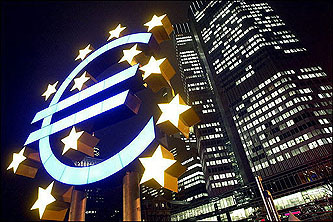As part of its rescue plan for the euro, the European Central Bank has started buying Greek and Portuguese debt. But at least so far, they’re plainly unwilling to  mount a serious operation: the value of their purchases is small (about €16.5 billion) and they’re making sure to “sterilize” their new holdings by selling off other bonds to make up for it, thus keeping the money supply steady. The Telegraph is unimpressed:
mount a serious operation: the value of their purchases is small (about €16.5 billion) and they’re making sure to “sterilize” their new holdings by selling off other bonds to make up for it, thus keeping the money supply steady. The Telegraph is unimpressed:
The ECB’s strategy of draining liquidity to offset the stimulus from the bond purchases risks making matters worse. “They are using one-week deposits for sterilisation and the effects of this to make short-term funding more expensive. This will force banks to sell assets to shrink their balance sheet and risks causing a credit crunch,” said [Hans Redeker, currency chief at BNP Paribas].
Mr Redeker said the ECB is pursuing a contractionary policy to assuage concerns in Germany that Club Med bond purchases will stoke inflation. “They have read the German press and it made their hair stand up on their necks. The reality is that a deflationary cycle is developing in Euroland and the ECB will eventually have to start quantitative easing,” he said.
Ewald Nowotny, Austria’s central bank chief, called the German concern over inflation “hysteria.” But hysteria or not, it seems to be in control of Europe’s destiny. That means a non-expansionary monetary policy and fiscal austerity are going to be their answer to a massive recession. Maybe Europe doesn’t have any choice at this point. I don’t know. But it sure doesn’t bode well for their near-term economic growth prospects.
UPDATE: On the other hand, perhaps the ECB’s sterilization efforts are mainly symbolic, designed to appease German public opinion while not having any actual contractionary effect. Tracy Alloway rounds up the arguments at FT Alphaville.

















